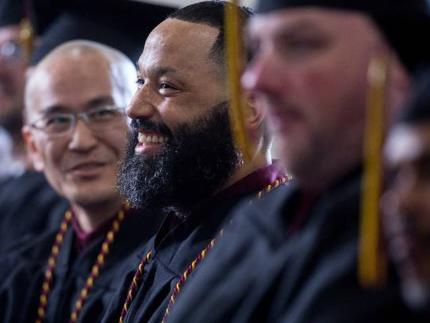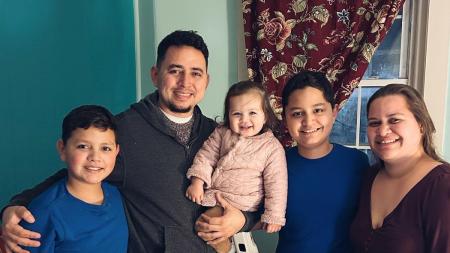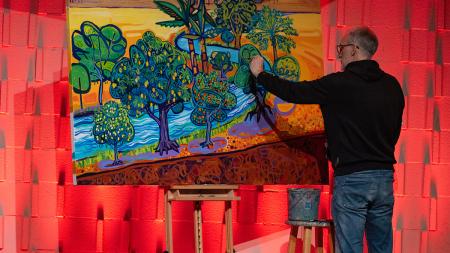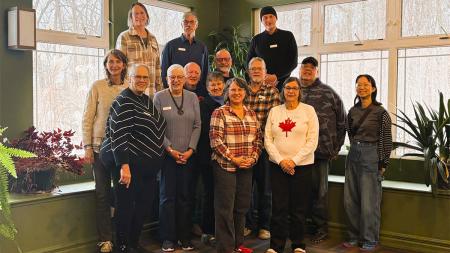Reflections on Earning a Degree Behind Bars

In 2015, Calvin University, Calvin Theological Seminary, and the Michigan Department of Corrections set out on a venture called the Calvin Prison Initiative. The first-of-its-kind program in the state of Michigan provides inmates with a chance to earn a bachelor’s degree from Calvin University. The goal of the program, which is funded entirely by private donations and grants, is to improve prison culture and curb recidivism by equipping prisoners with a formative education.
On Fri., May 5, 2023, 15 students received their bachelor’s degrees, and an additional 11 received associate’s degrees in faith and community leadership in a commencement ceremony inside Handlon Correctional Facility in Ionia, Mich.
The ceremony featured brief remarks from leaders of each of the program’s three key partners: Heidi Washington, director of the Michigan Department of Corrections; Jul Medenblik, president of Calvin Theological Seminary; and Wiebe Boer, president of Calvin University. Wilson Rivera Bey and James Hammett, both 2023 CPI grads, provided student remarks. Commencement addresses were given by Michelle Loyd-Paige, outgoing executive director to the president for diversity and inclusion at Calvin University, and Nicholas Wolterstorff, a renowned philosopher, theologian, and emeritus professor of Calvin University.
Most of the 2023 graduates are serving life sentences. However, through their Calvin education, moral and spiritual formation has taken place, shaping their minds and hearts.
Eleven graduates from the Class of 2023 reflect on their experience in the CPI program, how it has shaped them, and the impact they hope to make with their Calvin University education.
What is your single greatest takeaway from your Calvin University education?
Tim Baker: The sense of accomplishment that I was able to achieve. Five years ago I didn’t know who I was, where I belonged, or where I was going. Throughout this program, I found most of that. Furthermore, my faith has grown into something I can be proud of.
Wilson Rivera Bey: The possibility of the impossible. First, the possibility that change can take place with a broken person and a broken system. Second, that I can achieve such an accomplishment, a BA degree, if proper application takes place. The totality of my takeaway is that change is possible, no matter what obstacles may appear before me, no matter your life experiences, and no matter how others view you. Lastly, that there are people that care about “those in prison,” who see us as fellow human beings and not a number or title (label).
Jason Symonds: I cannot narrow it to one. So I give you two that relate to each other. One, life, like history, does not exist in a vacuum. Two, I am a person worthy of dignity, love, and humanity, and I evidence this fact by giving dignity, love, and humanity to others.
Denium Roman: An expanded worldview which allows me to participate in a wider breadth of conversations.
Oscar Montes: My greatest takeaway is that I was drawn closer to God, and my ability to serve his purposes.
James Hammett: Being a part of the CPI community. This community is amazing and bolsters the educational experience.
Why is it important to offer a Christian liberal arts education behind bars?
Geary Gilmore: Because it is the best way to change the culture of the prison.
Oscar Montes: Growth is a lifelong process, and as incarcerated individuals we need all the tools to become better people. Thus, a Christian liberal arts education is essential to help guide those seeking to improve in life.
Marcus Johnson: A Christian liberal arts education in inmates allows those seeking redemption, change, and a purpose an opportunity to achieve these goals. In addition, inmates can learn the importance of helping others as well.
Milo Copeland: This is where it is needed the most.
James Hammett: It changed my perspective about everything, including myself.
How does it feel to be a Calvin University graduate?
Tim Baker: Great. I never thought I would be a college student, let alone a graduate. Calvin extended their reach to allow me the opportunity for growth.
Wilson Rivera Bey: The simple word “graduate” alone gives me a sense of self-worth, but combined with Calvin University, I am beyond expression. I do acknowledge the sense that I have of belonging to the Calvin University community and how proud I am to claim it as my alma mater.
Marcus Johnson: I am very happy to be a graduate. Being a first-generation graduate, I believe I have done my family proud by earning a BA while in prison.
Jeff Mata: It feels great to be a Calvin University graduate because it shows others that they can make something of their lives even when being behind bars.
Hank Jones: It feels like I have a sense of accomplishment. I could never have imagined that I, a high-school dropout, would one day receive my bachelor’s degree. Also, I now feel like the sky is not the limit; the universe is the limit.
What’s next? What do you hope to do with your Calvin education?
Tim Baker: Continue learning. Before Calvin, I never read a book all the way through. I plan to use my education to help others in the field of cooking or welding. I am interested in these subjects as a life plan.
Marcus Johnson: I would like to take part in any mentoring program or anything to do with helping those who can’t help themselves (i.e., hospice program).
Jeff Mata: I want to help those who are struggling to thrive in life. I will take my leadership skills and put them to use in Food Tech.
Jason Symonds: I will use it as a springboard to continue growing as a Christian and doing my best to positively impact the people in my life.
Denium Roman: I hope to transfer to the Hospice Unit at Jackson as a Prisoner Palliative Care aide.


